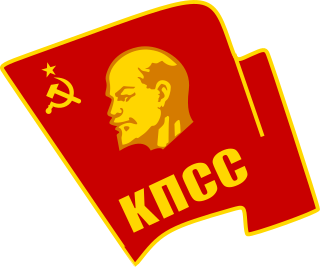
The Communist Party of the Soviet Union (CPSU), also known by various other names during its history, was the founding and ruling party of the Soviet Union. The CPSU was the sole governing party of the Soviet Union until 1990 when the Congress of People's Deputies modified Article 6 of the 1977 Soviet Constitution, which had previously granted the CPSU a monopoly over the political system.
The organization of the Communist Party of the Soviet Union was based on the principles of democratic centralism.

Vladimir Antonovich Ivashko was a Soviet Ukrainian politician, briefly acting as General Secretary of the Communist Party of the Soviet Union (CPSU) during the period from 24 to 29 August 1991. On 24 August Mikhail Gorbachev resigned from the post, and on 29 August the CPSU was suspended by the Supreme Soviet. Before becoming General Secretary he had been voted Gorbachev's Deputy General Secretary within the Party on 12 July 1990, a newly created position as a result of the 28th Congress of the Communist Party.

The General Secretary of the Central Committee of the Communist Party of the Soviet Union was the leader of the Communist Party of the Soviet Union (CPSU) that by the late 1920s had evolved into the most powerful of the Central Committee's various positions. Seldom in Soviet history would any other office trump the authority of General Secretary. From 1929 until the union's dissolution, the holder of the office was the de facto leader of the Soviet Union, because the post controlled both the CPSU and the Soviet government. The power of the office can be traced to Joseph Stalin when he elevated the office to overall command of the Communist Party and by extension the whole Soviet Union. Once Stalin outmaneuvered Leon Trotsky and removed his major political rivals through purges, the General Secretary exercised total control of party and nation. Nikita Khrushchev renamed the post First Secretary in 1953 as part of de-stalinization. The change was reverted in 1966. The office grew out of less powerful secretarial positions within the party: Technical Secretary (1917–1918), Chairman of the Secretariat (1918–1919), and Responsible Secretary (1919–1922).

The Secretariat of the Central Committee of the Communist Party of the Soviet Union (CPSU) was responsible for managing and directing the day-to-day operations of the Communist Party of the Soviet Union, while the Politburo was charged with the policy-making aspects of the party. The Secretariat was a component agency of the party's Central Committee.

Dinmukhamed Akhmetuly "Dimash" Kunaev was a Kazakh Soviet communist politician who served as the First Secretary of the Communist Party of Kazakhstan.
The Anti-Party Group was a group within the leadership of the Communist Party of the Soviet Union that unsuccessfully attempted to depose Nikita Khrushchev as First Secretary of the Party in June 1957. The group, given that epithet by Khrushchev, was led by former Premiers Georgy Malenkov and Vyacheslav Molotov and former First Deputy Chairman Lazar Kaganovich. The group rejected both Khrushchev's liberalization of Soviet society and his denunciation of Joseph Stalin.

Grigory Vasilyevich Romanov was a Soviet politician and member of the Politburo and Secretariat of the Communist Party of the Soviet Union. In 1985, he was considered Mikhail Gorbachev's main rival in the succession struggle after the death of Konstantin Chernenko in March 1985, the third Soviet leader to die in just a few short years.
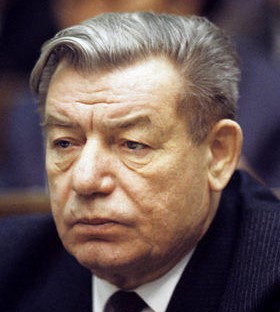
Gennady Vasilevich Kolbin was the First Secretary of the Central Committee of the Communist Party of the Kazakh SSR from 16 December 1986 to 22 June 1989.
The history of the Communist Party of the Soviet Union was generally perceived as covering that of the Bolshevik faction of the Russian Social Democratic Labour Party from which it evolved. The date 1912 is often identified as the time of the formation of the Communist Party of the Soviet Union as a distinct party, and its history since then can roughly be divided into the following periods:

Yekaterina Alexeyevna Furtseva was a Soviet politician and the second woman to be admitted as secretary of the Central Committee of the Communist Party of the Soviet Union.
The 28th Congress of the CPSU was held in Moscow. It was held a year ahead of the traditional schedule and turned out to be the last Congress of the Communist Party of the Soviet Union (CPSU) in the history of the party. Notably, this congress displayed open factionalism: opposing views were championed by the centrist "CPSU Central Committee platform", the liberal "Democratic Platform" and the conservative "Marxist Platform".

Kirill Trofimovich Mazurov was a Soviet Byelorussian partisan, politician, and one of the leaders of the Belarusian resistance during World War II who governed the Byelorussian Soviet Socialist Republic as First Secretary of the Communist Party of Byelorussia from 1956 until 1965, when he became a member of the Politburo of the CPSU.
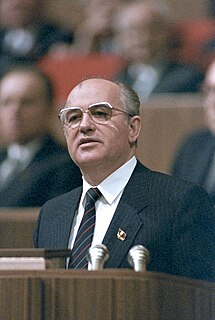
The 27th Congress of the Communist Party of the Soviet Union was held from 25 February to 6 March 1986 in Moscow. This was the first congress presided over by Mikhail Gorbachev as General Secretary of the Central Committee of the CPSU. In accordance with the pattern set 20 years earlier by Leonid Brezhnev, the congress occurred five years after the previous CPSU Congress. Much had changed in those five years. Key figures of Soviet politics, Mikhail Suslov, Leonid Brezhnev, Yuri Andropov, Dmitriy Ustinov, and Konstantin Chernenko had died, and Mikhail Gorbachev had become General Secretary of the Party. For this reason the congress was widely anticipated, both at home and abroad, as an indicator of Gorbachev's new policies and directions. The congress was attended by 4993 delegates. It elected the 27th Central Committee.
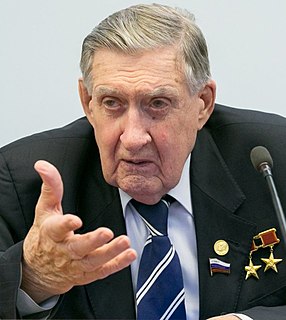
Vladimir Ivanovich Dolgikh was a Russian politician who was head of the Metallurgical Department of the Central Committee Secretariat of the Communist Party of the Soviet Union. He was a candidate member (non-voting) of the Politburo from 1982 to 1988.
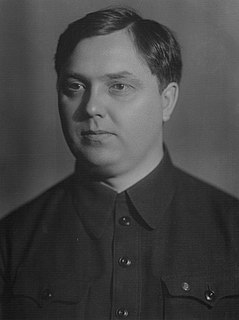
Georgy Maximilianovich Malenkov was a Soviet politician who briefly succeeded Joseph Stalin as the leader of the Soviet Union. However, at the insistence of the rest of the Presidium, he relinquished control over the party apparatus in exchange for remaining Premier and first among equals within the Soviet collective leadership. He then became embroiled in a power struggle with Nikita Khrushchev that culminated in his removal from the premiership in 1955 as well as the Presidium in 1957.
The Leningrad City Committee of the Communist Party of the Soviet Union, commonly referred to as the Leningrad CPSU gorkom, was the position of highest authority in the city of Leningrad roughly equating to that of mayor. The position was created in March 1918, and abolished on August 24, 1991. The First Secretary was a de facto appointed position usually by the Politburo or the General Secretary himself. Until the abolition of the CPSU monopoly on power on March 14, 1990, he had actual power in Leningrad.
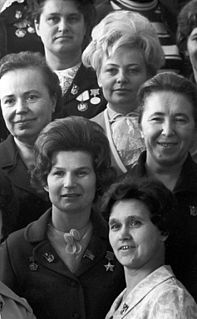
The 24th Congress of the Communist Party of the Soviet Union (CPSU) was convened in Moscow from 30 March to 9 April 1971. The Congress brought together 4,963 delegates, with 102 foreign delegations from 91 countries as observers.
The Moscow Regional Committee of the Communist Party of the Soviet Union, commonly referred to as the Moscow CPSU obkom, was the position of highest authority in Moscow Oblast during most of the existence of the Soviet Union. The position was created on 24 January 1929 as the Central Industrial Oblast, and abolished on 29 August 1991 although most authority was lost in June that year to the position of Governor of Moscow Oblast. The First Secretary was a de facto appointed position usually by the Politburo or the General Secretary himself.

The All-Union Party «Union of Communists», is a communist party created in 1991 in the USSR, operating on the territory of the countries of the former Soviet Union, the second communist party created after the dissolution of the Communist Party of the Soviet Union.